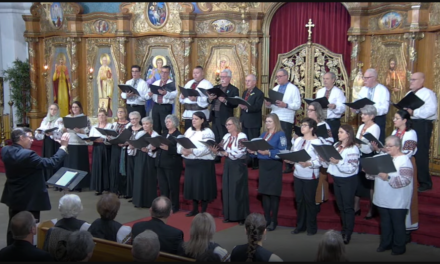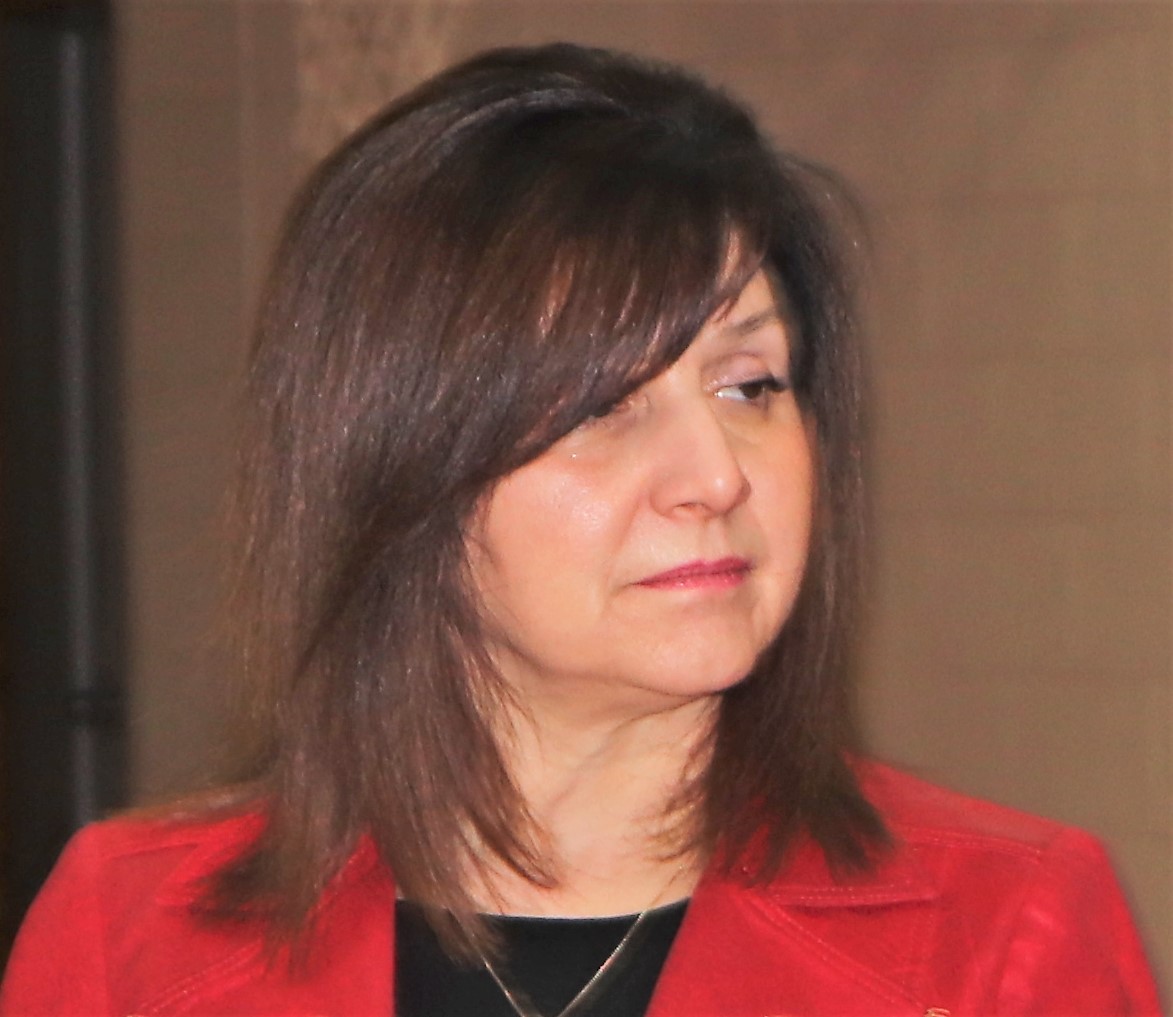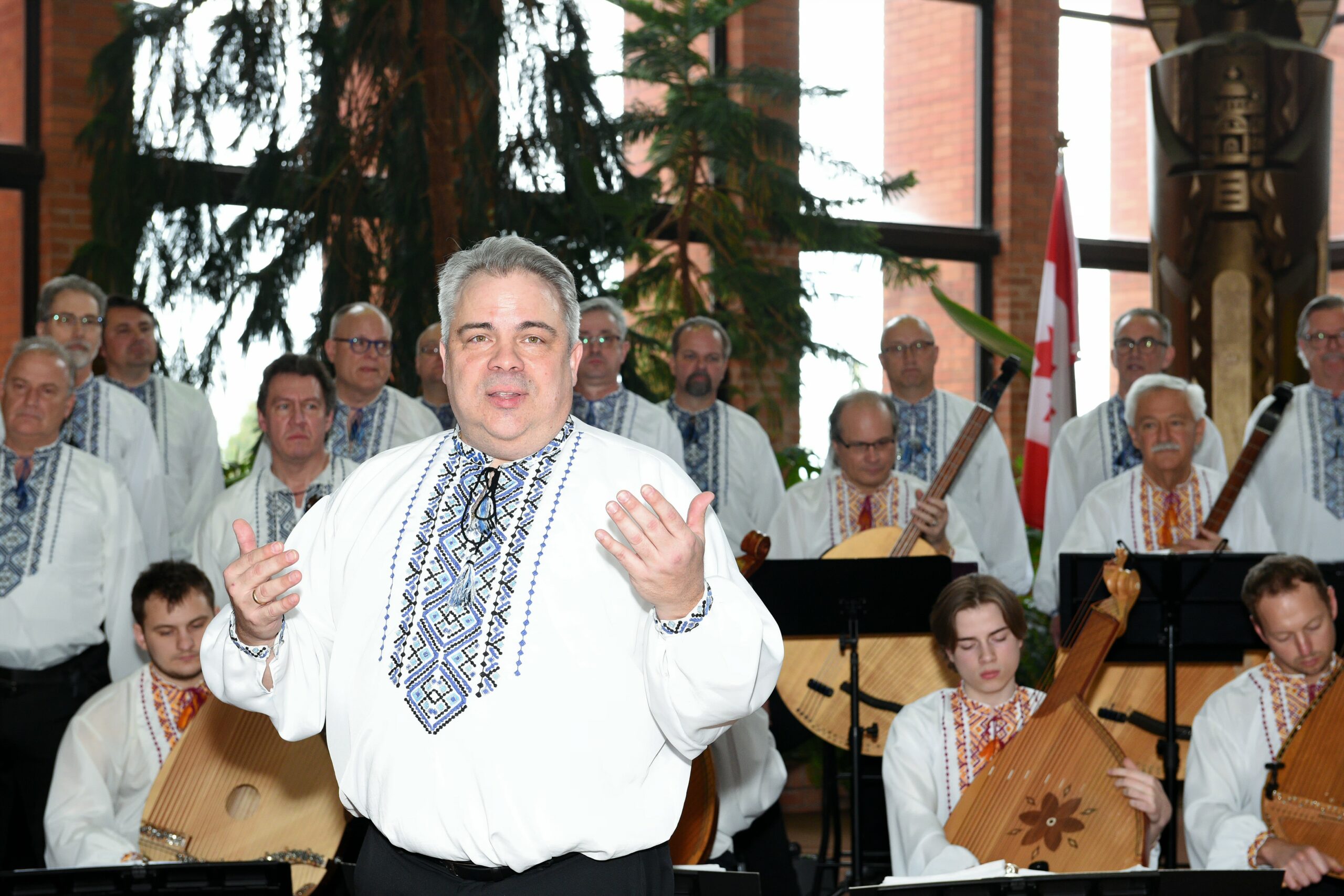Yuri Bilinsky, Toronto.
How many times have you had tears in your eyes after a performance? Theatre goers may say that audiences often tear up after a good show. But have you seen an actress cry after a performance? I think that the latter happens much less often. I saw this for the first time at the premiere of Counting Sheep at St. Vladimir Institute in Toronto on January 22, 2015.
I am sure that most viewers will perceive Counting Sheep primarily emotionally, and only then artistically. The performance by the Toronto band Lemon Bucket Orchestra cycled around the events of the last 14 months – from the Maidan to battle for the Donetsk airport. Events on the same day, January 22, 2015, when we learned of the numerous dead and captured defenders of the airport, appeared before my eyes in the final stage performances where people in uniform held a funeral with the backdrop of photos of the destroyed airport.
Critics often say that historical events are best translated into literature and drama only after a long time. Works made in haste after some events, they say, are usually momentary impressions and concerns. Counting Sheep in this regard makes a strong impression thanks to its relevance.
Many actors who play in this performance have a stronger personal relationship with what is happening in Ukraine than most of their Canadian viewers. The main performers, Mark Marczyk and Marichka Kudryavtseva, were on the Maidan and in the ATO area. In an interview with the New Pathway, Marichka said that the main goal of the play was to show Canadians what is happening in Ukraine. This is achieved through performance – the audience who know a lot and worry about Ukraine, will have a deep, emotional experience, and those who know less about these events will be impressed by the singing and music that will no doubt encourage them to learn more.
The singing and music are central in Counting Sheep. The play is, after all, called a “guerrilla-theater event of the Ukrainian revolution told through traditional carols and ballads.” The music and singing by Lemon Bucket Orchestra and Marichka Kudryavtseva were, as always, up to the highest standard. Carols, New Year songs and ballads were well matched for each of the themes of the play – the beginning of the Maidan, beatings by Berkut, the deaths of the Heavenly Hundred, the war in the Donbas.
It was not only the quality of the music that made the audience empathize with the show. It was the emotions conveyed by the actors. As Marichka Kudryavtseva told the New Pathway, in Counting Sheep she had to pour out everything that had filled her up this past year from her experiences on the Maidan and during the war. And pour she did. At the end of the show it was a bit unexpected to see tears in her eyes but it was completely understandable.
One part of the author’s intention was direct involvement of the audience in the performance. The crowd danced with the actors, wore helmets, carried baseball bats, built tire barricades and threw stones at Berkut. It was obvious that many in the audience liked this idea. There might have been others that did not understand it, however no one was forced them to participate if they didn’t feel comfortable.
The consumption of food during the performance, which was also an integral aspect to the piece, involved all without exception. Food, like all elements in Counting Sheep, was part of the recreated environment of Maidan. Thus the buckwheat porridge, which was distributed in a typical aluminum pot, occupied an important place. These beaten-up pots can mainly be found in Ukraine now, so I would not be surprised if it was brought from there or even from the Maidan. However, the porridge was good, but it was overshadowed by the varenyky.
The amount of food viewers received was impressive. For $100, you get to see a show, but also get 50 ml. vodka, a glass of wine and brandy compote with at least 12 dishes. I think even the biggest moralists will not complain about the discrepancy between the pathos of the event and food consumption because of the quality of the dishes and the fact that they repeated what was served on the Maidan.
The videos, which were shown on the four walls of the theatre coincided completely in many cases with what the actors displayed. It was obvious that the actors are amateurs, but with all the musical performance, not a lot of acting is required. The acting though did not hinder the show; it sometimes reinforced the general impression, such as in the scene of mourning for the deceased of the Maidan.
The last scene of Counting Sheep was a memorial song for all the victims in Ukraine. Ukrainian peasant genius gave birth to this beautiful song in the steppes and valleys of the Dnieper River, which saw centuries of war and bloodshed. The soil, which the actors put on the table, symbolizing the graves of heroes, was so black, so similar to the Ukrainian black earth, which is now accepting modern day Cossacks.
Counting Sheep is playing at St. Vladimir Institute until 1 February. Tickets can be purchased at www.countingsheepkoljada.com.
Share on Social Media




































